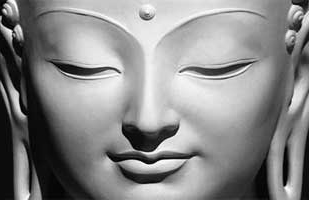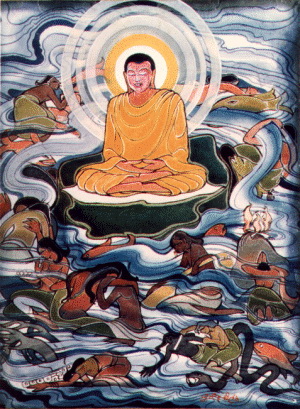
Chapter II - APPAMADA VAGGA - Heedfulness

THE HEEDLESS DIE; THE HEEDFUL DO NOT
Appamado amata padam pamado maccuno padam
Appamatta na miyanti ye pamatta yatha mata.
Etam visesato natva appamadamhi pandita
Appamade pamodanti ariyanam gocare rata
Te jhayino satatika niccam dalha parakkama
Phusanti dhira nibbanam yogakkhemam anuttaram
Heedfulness is the path to the deathless, heedlessness is the path to death.
The heedful do not die.
Distinctly understanding this (difference) the wise (intent) on heedfulness rejoice in heedfulness, delighting in the realm of the Ariyas.
The constantly meditative the ever steadfast ones realise the bond-free supreme Nibbana
II:01 Magandiya's plot against queen Samavati
Queen Samavati had many maids-of-honour who attended to her every need. Among them was a maid called Khujjuttara whose duty was to buy flowers for Samavati from the florist Sumana everyday. One day, Khujjuttara had the opportunity to listen to a sermon delivered by the Buddha at the home of Sumana. Because of her spiritual attainment in her previous lives, the words of the Enlightened One helped her to attain Sotapatti. On returning to the palace, she repeated the sermon to Samavati and her other maids and they also realised the Dhamma. From that day, Khujjuttara did not have to do any major work, but was looked upon as mother and teacher to Samavati. Being an extremely intelligent person, she listened to the discourses of the Buddha and repeated them to Samavati and her maids. So great was her intellect that in the course of time, Khujjuttara even mastered the Dhamma.
Samavati and her maids liked to see and pay homage to the Buddha; but were afraid that the king might disapprove, so they would look at the Buddha by peeping through openings in the palace walls. They paid respects to the Buddha in this manner everytime he passed the palace on his way to the homes of other devotees.
At that time, the king had another consort by the name of Magandiya. She was the daughter of a brahmin. The brahmin once decided that the Buddha was the only person who was worthy enough to marry his very beautiful daughter. So, he offered to give his daughter in marriage to the Buddha. Turning down his offer, the Buddha said, 'Even after seeing the most beautiful girls, Tanha, Arati and Raga, the daughters of Mara, I felt no desire in me for sensual pleasures. After all, what is this body which is full of filth?" The Buddha knew from the beginning that the brahmin and his wife had reached the stage of mental purification where they could attain Anagami that very day, hence his reply to the brahmin in the above manner.
On hearing those words of the Buddha, both the brahmin and his wife realised that all beauty is impermanent, and attained the third stage of Sainthood. They entrusted their daughter to the care of her uncle and both joined the Order. Eventually, they attained Arahanthood. But the story does not end there. The daughter, Magandiya, was very proud and she took the Buddha's words as a personal insult. She became very bitter and vowed to take revenge when the opportunity arose.
Later, her uncle presented Magandiya to King Udena and she became one of his consorts. Magandiya learned of the arrival of the Buddha in Kosambi and how Samavati and her maids paid homage to him through holes in the walls of their living quarters. She planned to take her revenge on the Buddha and to harm Samavati and her maids. Magandiya told the king that Samavati and her maids had made holes in the walls of their living quarters and were being unfaithful to him. King Udena saw the holes in the walls, but when the matter was explained to him he did not get angry.
But Magandiya persisted in trying to make the king believe that Samavati was not loyal to him and was trying to kill him. On one occasion, knowing that the king would be visiting Samavati within the next few days and that he would be taking along his lute with him, Magandiya inserted a snake into the lute and covered the hole with a bunch of flowers. Magandiya followed King Udena to Samavati's quarters after trying to stop him on the pretext that she had some premonition and that she was worried about his safety. At Samavati's place Magandiya removed the bunch of flowers from the hole of the lute. The snake came out hissing and coiled itself on the bed. When the king saw the snake he believed Magandiya's words that Samavati was trying to kill him. The king was furious. He commanded Samavati to stand and all her ladies to line up behind her. Then he fitted his bow with an arrow dipped in poison and shot the arrow. But Samavati and her ladies bore no ill towards the king and through the power of goodwill (metta), the arrow did not hit the target although the king was an excellent archer. Seeing this obvious miracle, the king realised the innocence of Samavati and he gave her permission to invite the Buddha and his disciples to the palace for almsfood and religious discourses.
Magandiya, realising that none of her plots had materialised, made a final, infallible plan. She sent a message to her uncle with full instructions to go to Samavati's palace and burn down the building with all the women inside. As the house was burning, Samavati and her maids-of-honour being advanced in spiritual attainment, continued to meditate in spite of the danger. Thus, some of them attained the second stage of Sainthood and the rest were also benefited before the palace was gutted with them inside.
As soon as he heard the news, the king rushed to the scene, but it was too late. He suspected that it was done at the instigation of Magandiya but he did not show that he was suspicious. Instead, he said, 'While Samavati was alive I had been fearful and alert thinking I might be harmed by her; only now is my mind at peace. Who could have done this? It must only have been done by someone who loves me very dearly.' Hearing this, the foolish Magandiya promptly admitted that it was she who had instructed her uncle to do this terrible deed. Thereupon the king pretended to be very pleased with her and said that he would grant her a great favour, and honour all her relatives. So, the relatives were sent for and they came gladly. On arrival at the palace, all of them, including Magandiya, were seized and put to death in the palace courtyard. Thus the evil Magandiya was punished for plotting the death of the holy queen and her attendants.
When the Buddha was told about these two incidents, he said that those who are mindful do not die; but those who are negligent are as dead even while living.
Notes:
Appamada, literally, means non-infatuation, i.e., ever-present mindfulness, watchfulness, or earnestness in doing good.
The ethical essence of Buddhism may be summed up by this word — appamada. The last words of the Buddha were — appamadena sampadetha — strive on with diligence.
Amata — Nibbana, the ultimate goal of Buddhists. As this positive term clearly indicates, Nibbana is not annihilation or a state of nothingness as some are apt to believe. It is the permanent, immortal, supramundane state which cannot be expressed in mundane terms.
This should not be understood to mean that they are immortal. No being is immortal, not even Buddhas or Arahants. The idea implied herein is that the heedful, who realize Nibbana, are not reborn, and so do not die. The heedless are regarded as dead because they are not intent on doing good, and are subject to repeated births and deaths.
Knowing well that there is emancipation for the heedful, but not for the heedless.
Here Ariyas mean the pure ones like the Buddhas and Arahants. The realm of the Ariyas means the thirty-seven factors of Enlightenment (Bodhipakthiyadhamma) and the nine supramundane states.
The thirty-seven Factors of Enlightenment (Bodhipakkhiyadhamma) are:—
The four Foundations of Mindfulness (Satipatthana) — namely,
1. contemplation of the body (kayanupassana)
2. contemplation of the feelings (vedananupassana)
3. contemplation of thoughts (cittanupassana) and
4. contemplation of phenomena (dhammanupasana).
The four Supreme Efforts (Sammappadhana) — namely,
1. the effort to prevent evil that has not arisen
2. the effort to discard evil that has already arisen
3. the effort to cultivate unarisen good and
4. the effort to promote good that has already arisen.
The four Means of Accomplishment (Iddhipada) — namely, will (chanda), energy (uiriya), thought (citta), and wisdom (vimamsa).
The five Faculties (Indriya) — namely, confidence (saddha), energy (viriya), mindfulness (sati), concentration (samadhi), and wisdom (panna).
The five Forces (Bala), having the same names as the Indriyas.
The seven Constituents of Enlightenment (Bojjhanga) — namely, mindfulness (sati), investigation of the Truth (Dhammavicaya), energy (viriya), joy (piti), serenity (passaddhi), concentration (samadhi), and equanimity (upekkha).
The Eightfold Path (Atthangikamagga) — namely, right views (samma ditthi), right thoughts (samma samkappa), right speech, (samma vaca), right actions (samma kammanta), right livelihood (samma ajiva), right endeavour (samma vayama), right mindfulness (samma sati) and right concentration (samma samadhi).
The nine supramundane States — namely, the four Paths, the four Fruits, and NibbanaHere meditation includes both concentration (samatha) and contemplation or insight (vipassana).
Yogakkhema — free from the four bonds of sense-desires (kama), craving for existence (bhava), false views (ditthi), and ignorance (avijja).
Nibbana = ni + vana, lit., departure from craving. It is a supramundane state that can be attained in this life itself. It is also explained as extinction of passions, but not a state of nothingness. It is an eternal blissful state of relief that results from the complete eradication of the passions.
Metaphysically Nibbana is the extinction of suffering; psychologically it is the elimination of egoism; ethically it is the eradication of lust, hatred and ignorance.

Editor for Buddha brothers: Matthew Laird Acred
If you should encounter any bugs broken links, or display errors just email us.
Buddha brothers has been running since Aug 2010 and can continue to run with your kind help!
If you love our website please donate so we can make this site even better !!